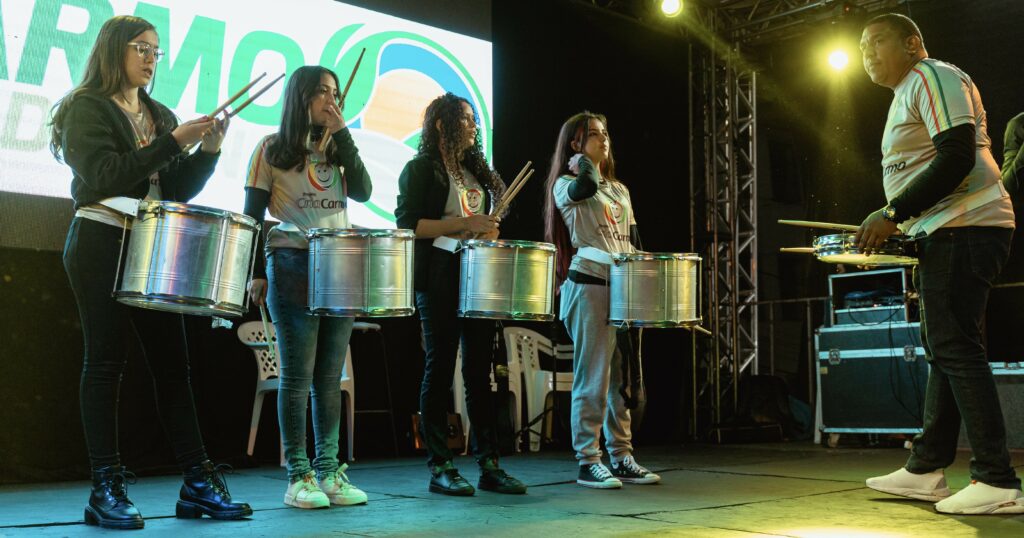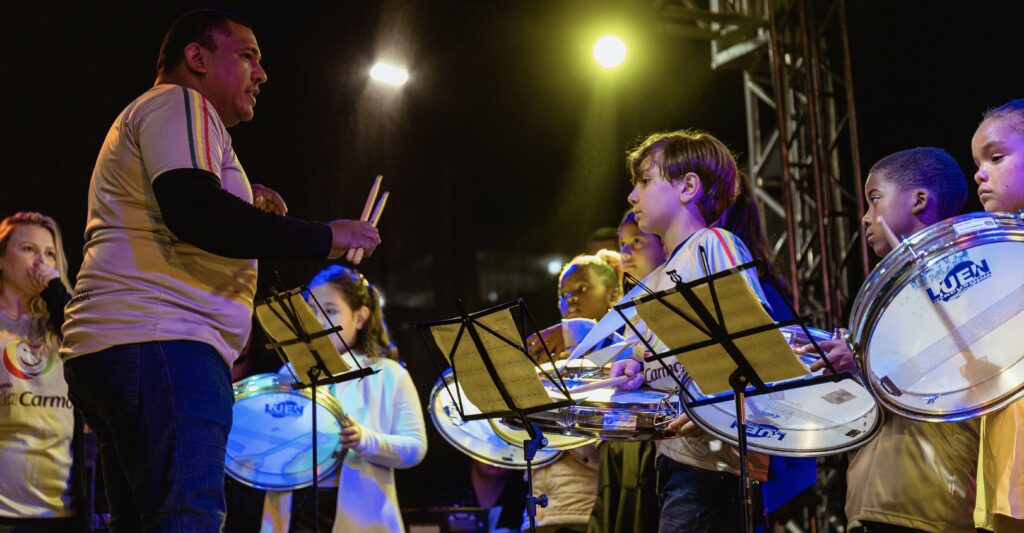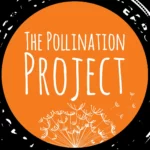Brazil is the world’s 7th largest greenhouse gas emitter, World Resources Institute.
“No matter what our personal, collective, or social circumstances are, we can all become better human beings. We can all make a difference in the world.” Wilmer Santiago Blanque Belizario, Musician and Founder of Sustainable Harmony
Art is the deepest expression of the human spirit. Through art, we can truly understand ourselves and the world that surrounds us. It is art that allows us to communicate more effectively with others and find a common place where harmonious coexistence is possible. For the musician Wilmer Santiago Blanque Belizario, music has proven to be a path for social change and environmental conservation, a legacy that he wants to pass over to the most vulnerable youth of Brazil.

Musical Inheritance
Santiago was born and raised in Calabozo, Venezuela, a colonial city that is the main producer of rice in the country. The love of music was a constant in Santiago’s family. His father used to collect a wide variety of albums from genres like danzon, salsa, merengue, son, and more; while his mother used to play in a folklore music group in his hometown.
“I was 4-years-old when I began to learn music. My mother played in a typical Venezuelan music band and she would take me to the rehearsals from the moment I was born,” recalls Santiago. “When I was 4, I had my first contact with a percussion instrument, and at 5 I was already playing in my mother’s band. It was something I was practically born with.”
Music ran through Santiago’s veins and by the time he was 7-years-old he became one of the first children who enrolled in the Youth and Children’s Symphony Orchestra with Antonio Estévez. Later on and following his calling, Santiago studied for a bachelor’s degree in Music specializing in Percussion.
“My mother and I were very close. We communicated through music,” says Santiago. “She knew a lot about music. She taught me everything she had learned through her experience and I was able to teach her what I learned academically. I am very proud of her because she was able to fulfill dreams she didn’t even know she had. She got recognized by the National Orchestra System for being the only person who got to be a representative for the parents’ society, a choir member, and the musical director of the orchestra from our city”.
A Musician's Journey
In July 2017, due to the economic and political difficulties in Venezuela, Santiago established himself in São Lourenço, Minas Gerais, Brazil.
“My idea was to come to Brazil and establish a center for teaching music that would be a part of the National Orchestra System which has a presence in over 60 countries,” says Santiago. “Later on, I presented my project to Carmo Coffee, a very big coffee company in Brazil. The president of the company in England is Venezuelan, so he told them about the orchestra system and how meaningful it is for children in vulnerable neighborhoods.”
In 2022, the project Cria Carmo – from the coffee company – began to support Santiago’s efforts to teach music to the children of São Lourenço.
“They believed in me and gave me the resources to gather the children and buy the uniforms for the recitals,” says Santiago. “The overarching goal of this project is to create a nurturing environment where music becomes a catalyst for positive change. By intertwining musical education, ecological awareness, and my journey, the project aspires to empower children with the tools to not only express themselves through music but also become advocates for environmental sustainability. Through this harmonious fusion, the project seeks to inspire resilience, foster hope, and build a community committed to creating a better and more sustainable world.”
Brazil's Environmental Crisis
Brazil is the most biodiverse country in the world, according to World Population Review, a place that holds 60% of the Amazon and where you can find 1 out of 4 of the existing plants in the world, as well as 4,738 fish species, 1,816 bird species, 1,141 amphibian species, 847 reptilian species, and 693 mammal species.
Unfortunately, Brazil is also in 1st place for greenhouse gas emissions among Latin American countries and the 7th place worldwide, according to the World Resources Institute. Almost half of the greenhouse gas emissions are generated by agriculture at 47.65%, followed by transportation at 18.99%, heat and electricity generate 9.02%, manufacturing and building generate 8.41%, and waste generate 6.7%, among others.
Deforestation is another big environmental problem in Brazil, according to the PRODES study made by the Brazilian National Institute of Space Research in the Cerrado area, the wooded grasslands that cover 20% of the country. Deforestation increased by 3.02% between August 2022 to July 2023. The states that had the highest deforestation were Maranhão with 2.928,81 km², 26.6% higher than the previous year; followed by Tocantins with 2.233,58 km², 20.28% higher than the previous year, and Bahía with 1.971,71 km², 17.91% higher than the previous year.
Sustainable Harmony
Besides music, Santiago also has a deep connection to the environment. He recognizes the importance of maintaining the fragile balance of an ecosystem and the need to create awareness among the new generations to take care of our planet.

“My connection with music has been a lifelong exploration of harmony and expression,” says Santiago. “My educational path, rooted in the National Conservatory Simon Bolivar in Caracas, laid the foundation for my musical skills, ranging from playing the contrabass in the Children’s and Youth Symphony Orchestra to participating in international percussion festivals and seminars with the Berlin Philharmonic, but above all I recognize the importance of uplifting children and youth to help them realize their crucial role in watching over the environment, being aware of their carbon footprint, knowing that their actions matter and that little by little we can make a sustainable change.”
Out of this desire to motivate children and youth positively and teach them music, Santiago created the project, Sustainable Harmony.
“I got the idea for Sustainable Harmony after talking with other refugees and seeing how kids, despite tough times, found joy in music. It hit me that even though I couldn’t fix everything, I could use music to bring happiness and learning to others,” says Santiago. “This project isn’t just about teaching kids to play instruments; it’s my way of dealing with challenges and showing that music can bring positive change. The moment I knew I had to do this was when I saw how music could be more than just a tune – it could teach kids and make them care about the environment. Harmonious Conservation is my way of saying that even if things are hard, we can still make the world better. It’s a mix of my own story, the strength of other refugees, and the power of music, creating a safe place where kids can learn, express themselves, and model a better future for themselves.”
In this project, Santiago is working with 42 children between the ages of 4 to 10-years-old, teaching them the essentials of music and empowering them to take care of the environment in a fun way.
“These kids come from working-class families that face financial constraints, making it challenging to afford childcare or live near governmental schools. In these neighborhoods, parents often struggle to make ends meet, and the lack of resources hinders their ability to provide additional educational and recreational opportunities for their children. Sustainable Harmony steps in to fill this gap by offering a unique blend of music education and environmental awareness. The project serves as a haven for those who might not have access to extracurricular activities due to financial or geographical constraints, empowering them to learn, create, and become advocates for a brighter future.”
Finding Help for The Project
 Santiago and his students had been working with a few instruments that a school lent them in exchange for their maintenance. But a friend told Santiago about The Pollination Project and how he could obtain a seed grant to buy the instruments he so desperately needed for his students to advance in their learning.
Santiago and his students had been working with a few instruments that a school lent them in exchange for their maintenance. But a friend told Santiago about The Pollination Project and how he could obtain a seed grant to buy the instruments he so desperately needed for his students to advance in their learning.
“I applied for the seed grant and I was sure I would get approved because my desire for this to happen was bigger than anything else,” says Santiago. “When I got the news from TPP about being approved I was so happy that I published it all over my social media. For me, that day felt like a party. I was truly happy that this amazing organization was supporting my students and our project. It made me feel I wasn’t doing this alone and that the project would be able to continue”.
With the help of TPP, Santiago will be able to buy drums, percussion kits, Brazilian tambourines, and more. He also hopes to add more children to his project and to have an orchestra that will begin locally but evolve to become a national project, where children grow to continue teaching music and environmental awareness
“Art gives me hope because it can transform the soul, any type of art can help us change the world for the better,” says Santiago. “Sustainable Harmony represents a lot of my life. I am a Venezuelan refugee who has called Brazil home for the past six years. I founded this project as a source of relief, not just for personal fulfillment but as a means to bring joy and purpose to the lives of others. The project’s inception is a testament to all refugees’ resilience, determination, and commitment to creating a harmonious blend of music, education, and environmental awareness.”
Join Us
If you are inspired by this work and have an idea for a project that addresses an issue that you are passionate about, we’d like to invite you to submit an application and together we will build a better, more compassionate future!
If you would like to support the work of more heartivists like this around the world, please visit our donation page and be a part of the change today!


![Monica Wang, a graduate of Yantai University in China, founded Xiaobu Vegan to promote veganism in her homeland. Having grown up in Guangxi with little early connection to animals, her perspective changed after moving to Shanghai and working at Plant Based Consulting. Her vegan journey began alongside rescuing two cats and a Japanese Akita, Meng Meng.
Xiaobu Vegan, established in 2020, uses educational videos, restaurant collaborations, and initiatives like the "Vegan Challenge" to advocate for plant-based diets. Supported by The Pollination Project, the organization aims to influence dietary habits and encourage compassion through its growing platform.
Read more on our website👇
[https://thepollinationproject.org/would-you-eat-your-best-friend]
#xbvegan #vegan #veganchina #animaladvocacy #animalrights #compassion #china #heartivism @animalchangemakers](https://thepollinationproject.org/wp-content/plugins/instagram-feed-pro/img/placeholder.png)